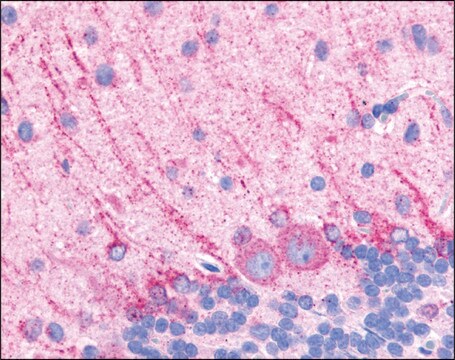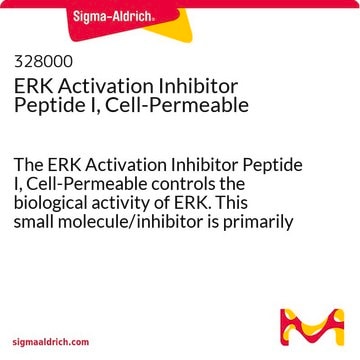324408
Anti-Dopamine D₅ Receptor Rabbit pAb
lyophilized, Calbiochem®
Sign Into View Organizational & Contract Pricing
All Photos(1)
About This Item
UNSPSC Code:
12352203
NACRES:
NA.41
Recommended Products
biological source
rabbit
Quality Level
antibody form
serum
antibody product type
primary antibodies
clone
polyclonal
form
lyophilized
does not contain
preservative
species reactivity
human, rat
manufacturer/tradename
Calbiochem®
storage condition
OK to freeze
isotype
IgG
shipped in
ambient
storage temp.
2-8°C
target post-translational modification
unmodified
Gene Information
human ... DRD5(1816)
General description
Anti-Dopamine D5 Receptor, rabbit polyclonal, recognizes the dopamine D5 receptor in rat brain. Does not cross-react with other dopamine receptors. It is validated for use in ELISA, WB, FC, and IHC.
Rabbit polyclonal antibody supplied as lyophilized, undiluted serum. Recognizes the ~49 kDa D5 dopamine receptor protein.
Recognizes the dopamine D5 receptor in rat brain. Does not cross-react with other dopamine receptors.
Immunogen
Human
a synthetic peptide (LPPGSNGTAYC) corresponding to amino acids 2-10 of human dopamine D₅ receptor, conjugated to carrier protein
Application
ELISA (see comments)
Flow Cytometry (1:100, see application references)
Immunoblotting (1:200)
Immunohistochemistry (1:2500)
Flow Cytometry (1:100, see application references)
Immunoblotting (1:200)
Immunohistochemistry (1:2500)
Warning
Toxicity: Standard Handling (A)
Physical form
Undiluted serum.
Reconstitution
Reconstitute the lyophilized antibody with 100 µl PBS containing 10 mg/ml BSA. For further dilution of the antibody use a similar buffer formulation. Following reconstitution, refrigerate (4°C).
Analysis Note
Positive Control
Rat brain
Rat brain
Other Notes
For immunohistochemistry, a 1:2500 dilution of the reconstituted antiserum demonstrated staining of specific cells in various regions of rat brain sections, including Cortex layer 5 and parafascicular nucleus. This antibody has also been reported to work for ELISA. Variables associated with assay conditions will dictate the proper working dilution.
McKenna, F., et al. 2002. J. Neuroimmunol.132, 34.
Legal Information
CALBIOCHEM is a registered trademark of Merck KGaA, Darmstadt, Germany
Not finding the right product?
Try our Product Selector Tool.
Storage Class Code
10 - Combustible liquids
WGK
WGK 2
Flash Point(F)
Not applicable
Flash Point(C)
Not applicable
Certificates of Analysis (COA)
Search for Certificates of Analysis (COA) by entering the products Lot/Batch Number. Lot and Batch Numbers can be found on a product’s label following the words ‘Lot’ or ‘Batch’.
Already Own This Product?
Find documentation for the products that you have recently purchased in the Document Library.
Antonis Prosilis et al.
The International journal of developmental biology, 66(1-2-3), 263-267 (2021-12-10)
Even before the first synapses appear, neurotransmitters and their receptors are present in the developing brain, regulating the cell fate of neuronal progenitors in neurogenic niches, such as the lateral ventricle. In particular, dopamine appears to play a pivotal role
Kentaro Ono et al.
Scientific reports, 7(1), 9181-9181 (2017-08-25)
We propose a new mechanism of sensory modulation through cutaneous dopaminergic signalling. We hypothesize that dopaminergic signalling contributes to differential cutaneous sensitivity in darker versus lighter pigmented humans and mouse strains. We show that thermal and mechanical cutaneous sensitivity is
Personalized Nanotherapy by Specifically Targeting Cell Organelles To Improve Vascular Hypertension.
Rajasekharreddy Pala et al.
Nano letters, 19(2), 904-914 (2018-12-26)
Ciliopathies caused by abnormal function of primary cilia include expanding spectrum of kidney, liver, and cardiovascular disorders. There is currently no treatment available for patients with cilia dysfunction. Therefore, we generated and compared two different (metal and polymer) cilia-targeted nanoparticle
Rajasekharreddy Pala et al.
ACS nano, 13(3), 3555-3572 (2019-03-13)
Patients with polycystic kidney disease (PKD) are characterized with uncontrolled hypertension. Hypertension in PKD is a ciliopathy, an abnormal function and/or structure of primary cilia. Primary cilia are cellular organelles with chemo and mechanosensory roles. In the present studies, we
Jacqueline S Coley et al.
PloS one, 10(2), e0117450-e0117450 (2015-02-04)
Drug abuse is a major comorbidity of HIV infection and cognitive disorders are often more severe in the drug abusing HIV infected population. CD14+CD16+ monocytes, a mature subpopulation of peripheral blood monocytes, are key mediators of HIV neuropathogenesis. Infected CD14+CD16+
Our team of scientists has experience in all areas of research including Life Science, Material Science, Chemical Synthesis, Chromatography, Analytical and many others.
Contact Technical Service








